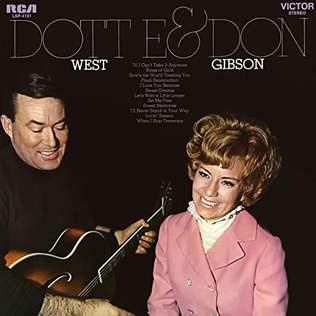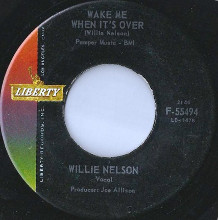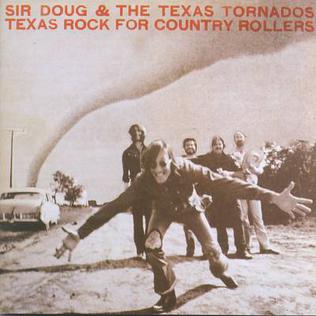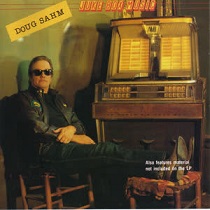
Tony Russell "Charles" Brown was an American singer and pianist whose soft-toned, slow-paced nightclub style influenced West Coast blues in the 1940s and 1950s. Between 1949 and 1952, Brown had seven Top 10 hits in the U.S. Billboard R&B chart. His best-selling recordings included "Driftin' Blues" and "Merry Christmas Baby".

Douglas Wayne Sahm was an American musician, singer-songwriter and multi-instrumentalist born in San Antonio, Texas. Sahm is regarded as one of the main figures of Tex-Mex music, and as an important performer of Texan Music. He gained fame along with his band, the Sir Douglas Quintet, with a top-twenty hit in the United States and the United Kingdom with "She's About a Mover" (1965). Sahm was influenced by the San Antonio music scene that included conjunto and blues, and later by the hippie scene of San Francisco. With his blend of music, he found success performing in Austin, Texas, as the hippie counterculture soared in the 1970s.

The Sir Douglas Quintet was an American rock band formed in San Antonio, Texas in 1964. With their first hits, they were acclaimed in their home state. When their career was established, the band relocated to the West Coast. Their move coincided with the burgeoning San Francisco psychedelic rock scene of the mid 1960s to early 1970s. Overall, the quintet were exponents of good-times music with strong roots in blues and Texas-regional traditions. The band's songs were most noted for the instantly distinguishable organ sound of Augie Meyers' Vox Continental.

Shotgun Willie is the 16th studio album by American country music singer-songwriter Willie Nelson, released on June 11, 1973. The recording marks a change of style for Nelson, who later stated that the album "cleared his throat". When Nelson refused to sign an early extension of his contract with RCA Records in 1972, the label decided not to release any further recordings. Nelson hired Neil Reshen as his manager, and while Reshen negotiated with RCA, Nelson moved to Austin, Texas, where the ongoing hippie music scene at the Armadillo World Headquarters renewed his musical style. In Nashville, Nelson met producer Jerry Wexler, vice president of Atlantic Records, who was interested in his music. Reshen solved the problems with RCA and signed Nelson with Atlantic as their first country music artist.

Gene and Debbe were an American pop/country duo hailing from Nashville, Tennessee, United States. They had some brief successes on the U.S. Billboard Hot 100 chart.

Dottie and Don is a studio album by American country music artists Don Gibson and Dottie West. It was released in March 1969 on RCA Victor Records and was produced by Chet Atkins and Danny Davis. The album was a collection of duet recordings between Gibson and West. It was both artists first album of duets to be recorded. Among the songs from the project, "Rings of Gold" became a major hit in 1969.
Dayton High School is a public secondary school located in Dayton in Liberty County in southeastern Texas, United States founded in 1895. In 2022 the school served 1,581 students in grades 9-12.
"The House of the Rising Sun" is an American traditional folk song, sometimes called "Rising Sun Blues". It tells of a person's life gone wrong in the city of New Orleans. Many versions also urge a sibling or parents and children to avoid the same fate. The most successful commercial version, recorded in 1964 by the British rock band The Animals, was a number one hit on the UK Singles Chart and in the US and Canada. As a traditional folk song recorded by an electric rock band, it has been described as the "first folk rock hit".

Mama Tried is the seventh studio album by American country music singer and songwriter Merle Haggard and The Strangers, released on Capitol Records in 1968. It reached number 4 on Billboard's country albums chart. The title song was one of Haggard's biggest hit singles and won the Grammy Hall of Fame Award in 1999.

Yesterday's Wine is the 13th studio album and a concept album by country singer Willie Nelson. Nelson had been recording for RCA Victor since the early 1960s, and had released no significant hit records. By 1970, his recordings had reached mid-chart positions. Nelson lost the money he made from his song-writing royalties by financing concert tours that were generally unsuccessful and unprofitable. In addition to problems with his music career, Nelson had a troubled personal life. He had divorced his wife, Shirley Collie, and his Tennessee ranch had been destroyed by a fire.
"Happy, Happy Birthday Baby" is a 1957 song written by Margo Sylvia & Gilbert Lopez. "Happy, Happy Birthday Baby" was originally performed by The Tune Weavers, who had their only hit with this song. Both Margo Sylvia and Gilbert Lopez were members of The Tune Weavers. The single went to number four on the R&B chart and went to number five on the Hot 100. The B-side of "Happy, Happy Birthday Baby, was The Tune Weavers version of "Ol' Man River".

David Allen Stich, also known as Rockin' Dave Allen and Dave Allen, was an American blues guitarist, singer and songwriter. Allen performed live throughout Texas and the Gulf Coast area from the late 1950s through the early 1980s. He recorded for the Jin, Eric, International Artists, Rock-a-Billy and Big Orange record labels for a total of sixteen 45 sides and two vinyl LPs. Some of this material has also appeared on compact disc anthologies by Ace Records. Approximately eighty minutes of Allen’s recordings remain unreleased.

"Night Life" is a song written by country music singer-songwriter Willie Nelson. Nelson was inspired to write the song during one of his trips from his home in Pasadena, Texas, to his work, singing at the Esquire Ballroom in Houston.

"Wake Me When It's Over" is a song written and recorded by American country music singer Willie Nelson. After being signed as a recording artist to Liberty Records in 1961, the song was recorded during his second session with the label in September 1961 at Radio Recorders. Selected as the A-side of one of the promotional singles, the song failed to chart.

Texas Rock for Country Rollers is the third album by American country-music singer Doug Sahm. Sahm composed for the album seven original songs, while covers constituted the rest of the album. It was released by ABC-Dot in 1976.

The discography of Doug Sahm started in 1955 with the release of "A Real American Joe" on Sarg Records. Sahm fronted three bands early in his career: The Pharaohs, The Dell-Kings and The Markays. He released the song "Crazy Daisy" (1959), and he had a local hit in San Antonio, Texas with "Why Why Why" (1960) on Renner Records. Sahm had another local hit with "Crazy, Crazy Feeling" (1961). After he disbanded the Sir Douglas Quintet in 1972, he was signed by Atlantic Records in October 1972, and he released his solo debut album Doug Sahm and Band.
"Baby Blue" is a song released in 1961 by The Echoes. It was written by Long Island assistant high school principal Sam Guilino and music teacher Val Lagueux. The song spent 12 weeks on the Billboard Hot 100 chart peaking at No. 12, while reaching No. 8 on Canada's CHUM Hit Parade. The song is noted for the Echoes spelling out the name of "Baby Blue" as "B B A B Y, B B L U E".

Hell of a Spell is an album by singer-songwriter Doug Sahm released by Takoma Records in January 1980. Sahm was signed to the label in 1979 after it was acquired by Chrysalis Records the same year. Upon request of the president of Takoma, Sahm recorded blues numbers and he dedicated the record to Guitar Slim. While the album was well received by the critics, it was a commercial failure.

Juke Box Music is an album by singer Doug Sahm released by Antone's Record Label in January 1989. Sahm returned to Austin, Texas in 1988 after living and experiencing success with his music in Sweden and Canada. Upon his return, Sahm started to perform at the Austin night club Antone's. The owner of the club, Clifford Antone signed him to his independent record label.















